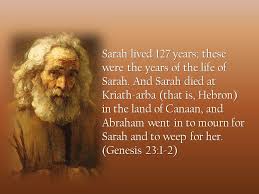Sarah Died in the Land of Canaan
and Abraham Went to Weep Over Her
23: 1-2
Sarah died in the land of Canaan and Abraham went to weep over her DIG: Why can Sarah be considered the mother of all believers? How old was she when she died? How old was Abraham? Isaac? Why are their ages listed at this time? What is mentioned here for the first time in the TaNaKh?
REFLECT: Why did the Torah record the account of the burial of Sarah? Is there a woman in your family history that is known for being a godly woman? Is there a godly woman in your life that you look up to and emulate? What touches you the most about Avraham’s reaction to his wife’s death?
Parashah 5: Chayei-Sarah (Sarah’s life) 23:1-25:18
(see my commentary on Deuteronomy, to see link click Af – Parashah)
The Key People include Sarah, Abraham, the Hittites, Ephron son of Zohar, Abraham’s servant, Rebecca, Laban, Isaac, Keturah, more children, and Ishmael.
The Scenes include Hebron, the cave of Machpelah near Mamre, Efron’s field, Aram Naharayim – Nachor’s city, B’er Lahai Roi in the Negev, and the region of Havilah to Shur.
The Main Events include Sarah’s death, the first property purchase in Isra’el (a burial cave for Sarah), a non-Canaanite bride for Isaac, marriage and comfort for Isaac, more children for Abraham through Keturah, Abraham’s death and burial next to Sarah, Ishmael’s descendants, and Ishmael’s death.
Do you ever wonder what it must have been like to be Abraham, especially in his old age? To be sure, we know that he was a man who loved and trusted ADONAI more than anything else. We also know that he practiced typical ancient Near Eastern hospitality. He had servants and possessions. And he loved his family. That much, and a little more, perhaps, is clear from the parashiyot that we have studied so far in Genesis. But what sort of personal characteristics did he have? What kind of man was he? Was he kind? Gentle? Quiet? Talkative?
In reality, the Torah tells us very little about his personal characteristics. In this, our last parashah dealing with Abraham, we will observe one very definite characteristic that he possessed. Abraham had the ability to look ahead and plan for the future. He did not just put the promises of God into a scrapbook to be looked at every so often. He deeply cherished those gifts that the LORD had given him to such an extent that he spent his life protecting them and doing his part to work for their fulfillment.

At the time of Sarah’s death, the family had evidently moved from Beersheba back to Hebron. She is the only woman whose age at death is mentioned in both the TaNaKh and the B’rit Chadashah. This indicates that she has a special place in biblical history and is an example to follow (Isaiah 51:1-2). She lived to be a hundred and twenty-seven years old (23:1). As the mother of the son of promise, she became the mother of all believers (First Peter 3:6). Abraham would have been a hundred and thirty-seven years old, and Isaac thirty-seven years old when his mother died.
She died at Kiriath Arba, or the city of Arabia, which eventually became known as Hebron, which means friend, because Abraham was the friend of God (14:13, 18:1), in the land of Canaan (23:2a). They had lived there many years earlier. This Kiriath Arba/Hebron connection is found elsewhere in the Bible (Joshua 14:15, 15:13 and 59, 20:7, 21:11; Judges 1:10). This is parashah contains the first instance in the Bible where burial of the dead is mentioned. Because of this many Jewish rules concerning forms of burial and the mourning period are derived from the details of this passage. One such burial custom is mourning. The word translated to mourn is from the Hebrew root which means to give an account. In essence, what Abraham did at Sarah’s burial was to relate the highlights of her life to those in attendance. This undoubtedly helped Abraham through his own personal grief. In addition, it afforded Abraham an opportunity to show honor and respect to Sarah.
For some reason, Abraham was not present at the time of her death. She was in Hebron and he was in Beersheba (21:33-34, 22:19). He might have been away on business, or perhaps they had two residences. At any rate, when Avraham heard that she had died, he went to mourn for Sarah and to weep over the lifeless body of his soul mate (23:2b). It seems possible that her death was mercifully quick because if she had been suffering for a long time, Avraham most assuredly would have been at her side. This was the death of his friend and life-long companion. Abraham loved Sarah deeply, and it must have grieved him terribly not to be with her when she died. The first man found weeping in the Bible is mourning the loss of a woman.



Leave A Comment